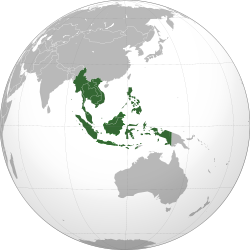ASEAN’s World Cup Goal: Where Football Meets Diplomacy – Analysis
By RSIS
ASEAN’s hopes of staging the 2030 FIFA World Cup is not just a matter of sporting pride, but an objective that is intricately tied to the character of ASEAN’s political community. Can it rise to the challenge?
By Benjamin Ho
FOREIGN MINISTERS of ASEAN meeting last January in Lombok, Indonesia floated the idea of a joint bid to host the 2030 FIFA World Cup finals. At last month’s Asia-Pacific Sports Conference in Singapore the idea also made the rounds among the region’s sporting fraternity.
The proposal raises several political challenges that ASEAN must first resolve if a credible bid is to be made. In fact, one sees striking parallels between the fortunes of ASEAN’s football and its politics. More than just being an element of post-Cold War soft power or as part of a country’s diplomatic strategy, a closer study into the game of football throws up several important characteristics that could inform our understanding of the political paradigm of the ASEAN community and its relations with the rest of the world.
Competency counts

There is little doubt that football is a national pastime in many ASEAN countries. But what is needed is not just enthusiasm and passion for the game, but competency and the ability to compete at the highest levels – an area where ASEAN falls short considerably. A cursory glance at the FIFA football rankings (introduced since 1992) makes for dismal reading: none of ASEAN member states is in the top 100 (Thailand the highest placed at 117). While there are no FIFA regulations stipulating minimum ranking requirements for host nations, surely one would expect a host to be sufficiently equipped to compete on the field. For ASEAN to be taken seriously, participation must be accompanied with proficiency. Likewise in international affairs, for ASEAN to flourish as a regional community, it needs to be more than just present on the global stage.
Football analysts have highlighted the lack of top-level experience as the Achilles’ heel in ASEAN’s football aspirations. A CNN report noted that few Asians have ventured into the top European leagues and among those who have done so, “none of them have set the world alight”. Indeed, few footballers from this region are good enough to make a mark beyond their domestic leagues. For ASEAN football to succeed, it has to possess significant representation among the football elite, playing and performing week-in week-out. Similarly, the ASEAN worldview needs to be more than just about responding to parochial and local interests, but also include engagements of global and international issues that include non-traditional security concerns such as climate change, food security and energy resources.
Size does not always matter
It is sometimes said that ASEAN players – who are smaller-built in comparison with their European counterparts – are unable to withstand and adapt to the high intensity, high impact character of the game played at the global level. In my view, this is not a problem. The stunning exploits of Spanish champions Barcelona have demonstrated how victories can be emphatically obtained – even with physically-smaller players. The point to note is that in football, one plays to one’s strengths while finding ways to work around or compensate for one’s weaknesses.
Politically, ASEAN’s socio-cultural diversity is the source of its greatest strength, imbuing the community with the cultural capacity and political flexibility to negotiate the meanderings of big-power relations. Nimble diplomacy on the part of ASEAN countries, such as Singapore’s hosting of the Singapore Global Dialogue and the Shangri-La Dialogue, can help countries in the region punch above their weight. Moreover with globalisation, the physical space in which international politics take place within has been greatly enlarged, thus necessitating the need for greater relational capacity, as opposed to a hegemonic big-power political stance.
Like football, international politics is a communitarian activity, where states enter into relationships with each other based on mutual interests and expectations of each other. In my view, the greatest obstacle to ASEAN’s dream of hosting the 2030 World Cup is not logistical or infrastructural, but political. Issues such as ASEAN leadership, state sovereignty and historical baggage continue to evoke tensions among ASEAN member states. While tensions are an inevitable part of every relationship (political or otherwise), it is necessary to ensure that these do not result in a clash or fracture among the parties involved. Moving forward, ASEAN ought to pool its best resources together in order to articulate a blueprint that will allow it to move towards its stated objective of achieving a common goal.
An ASEAN all-star cast
The idea of an ASEAN all-star football cast, for instance, will certainly allow for ASEAN to pit its best against the best thus allowing the region to achieve collective success. Similarly, ASEAN member states can forge together a political community that is built upon the strengths of individual member states, no doubt a challenging, but by no means an impossible task. This would however, require some form of multilateral strategy whereby roles are distributed and responsibilities shared.
Since its inception in 1967, ASEAN has lived through tumultuous years, even as it expanded its membership from five to 10. The 44th anniversary of ASEAN on 8 August witnessed the first time all 10 member states hoisted the ASEAN flag in front of their embassies throughout the world – a symbolic gesture to the goal of an ASEAN Community that they have committed to create by 2015.
Yet it is one thing to hoist a flag and another to hold up the World Cup. Current Real Madrid manager Jose Mourinho, whose insistence on collective teamwork over individual brilliance underscored his approach to football management, once quipped: “I hate to speak about individuals. Players don’t win you trophies, teams win trophies, squads win trophies”.
Benjamin Ho Tze Ern is an Associate Research Fellow in the Centre for Multilateralism Studies at the S. Rajaratnam School of International Studies (RSIS), Nanyang Technological University.
